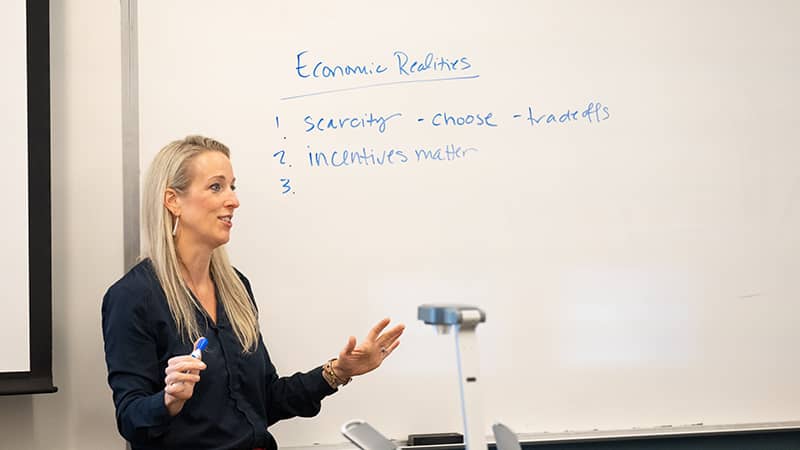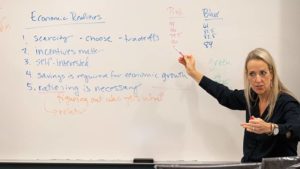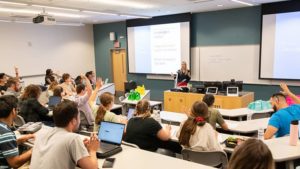
Terrorism poses a threat to global peace, but economists are often left out of the conversation when it comes to finding solutions. On June 28, The Fund for American Studies (TFAS) hosted a webinar on the economics of terrorism with notable economics professor Dr. Anne Bradley, the George and Sally Mayer Fellow and Vice President of Academic Affairs at TFAS. She suggested that economists have something unique to bring to the table on this issue.
Addressing TFAS alumni and virtual summer program participants, Dr. Bradley employed the economic way of thinking to analyze the costs, benefits and alternatives to the war against modern terrorism. Using al-Qaeda as a case study, she dove into the ways basic economic principles can be applied to modern global issues. She explained how economists study and analyze human behavior to find ways to alter the incentives that would influence individuals or organizations to commit acts of terror.
Bradley addressed the significance of this issue and why it is important for economists to study by asking, “Why, when we’re fighting terrorism so explicitly since 9/11, why is terrorism getting worse?”

Economists assert that there are three components of human action, all of which must be present for an individual to decide to act. First, someone experiences a state of uneasiness. Second, they have a vision for a better outcome. Third, they take conscious and purposeful steps to achieve said outcome.
“This is a really important assumption for economists, and I actually think it’s the reason economists should be brought to the table,” she said. “What it means is that people respond to incentives.”
She outlined how critical it is to understand the economic way of thinking in terms of how people respond to incentives, because terrorism is directly correlated to positive and negative incentives. As preferences change, economists analyze human behavior to find ways to alter incentives to minimize acts of terror.
Like anything, terrorism involves supply and demand. Supply is demand in disguise, and it is a response to demand as well: people supply things because they think people want them. When the demand for terror is minimized, the supply of terror will follow.

Governments and agencies can always intercept, but if the goal is to advance human flourishing, finding a way to decrease the demand for terrorism is the most crucial step toward eliminating terrorism itself.
“Terrorists are activated or motivated by some sort of social change,” she said. “This can manifest itself in different ways. They may want religious institutional change, government change, legal change, or cultural change.”
Following her presentation, attendees asked questions to learn more about the topic firsthand from Bradley’s expertise. Questions ranged from, “How can the private sector partner with the government to fight terrorism in a healthy, long-term relationship?” to “How can economic sanctions help curb the incentives for states supporting terrorism?”
Watch the full webinar here for Bradley’s perspective:

